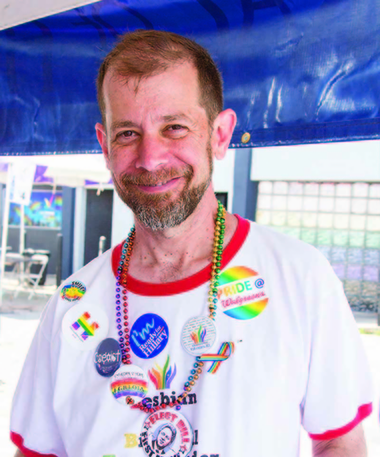Mosaic UMC: Progressive, affirming, accepting

by Rob Howard
Associate Editor
“We are open-minded, we believe there is a variety of ways to view the scripture,” says Rev. Scott Spencer, describing Mosaic United Methodist Church, a new, progressive UMC congregation in Oklahoma City. There is also “a variety of ways also to view traditional Christian doctrine,” said Spencer.
“We encourage questions, and we don’t necessarily have easy answers to either questions about doctrine or questions about life. We’re more willing to ask questions with you, and explore the options, rather than give you one option which you must believe.”
The church formed in June through the merger of two congregations – Epworth UMC and Leland Clegg Memorial UMC. The two Oklahoma City churches felt that together they could more effectively minister to progressive Methodists in the metro area.
Epworth, a 110-year-old church, had a large aging building, and felt they could better spend their money on ministry, than on maintaining a 100-year-old church facility, according to Spencer. So they reached out to a number of congregations “that had the same DNA, so to speak,” he said.
“And they started discussions with the Leland Clegg Memorial Church,” a little over a year ago. Clegg was 53 years old, and was the first UMC church in Oklahoma city to racially integrate.
The two churches went through a discernment process, determining what they wanted to keep, what they were willing to give up. Epworth, for instance, had long been a Reconciling Ministry Network (RMN) church. The RMN is a group of UMC churches that are affirming of LGBT people, and are working to change the denomination’s stance on homosexuality. Epworth wanted to remain an RMN church.
Clegg, for its part, had a lot of ethnic diversity in it, and wanted the new church to be open to that. They had always been welcoming to gay congregants, but were not an RMN church. They worked through those issues, and Mosaic was born on June 1 this year.
The search for a name for the merged congregation was part of that process. The governing committee, after considering many recommendations, came up with Mosaic United Methodist Church. Spencer explains the church’s name, by quoting Fr. Henri Nouwen, a Dutch priest: “A mosaic consists of thousands of little stones. Some are blue, some are green, some are yellow, some are gold. When we bring our faces close to the mosaic, we can admire the beauty of each stone. But as we step back from it, we can see that all these little stones reveal to us a beautiful picture, telling a story none of these stones can tell by itself.
“That is what our life in community is about. Each of us is like a little stone, but together we reveal the face of God to the world. Nobody can say: ‘I make God visible.’ But others who see us together can say: ‘They make God visible.’ Community is where humility and glory touch.” (Excerpt from Bread for the Journey.)
Spencer was appointed by the UMC Bishop to pastor the new church in March. He says the consideration the Bishop had was, “They wanted someone with an entrepreneurial nature, they view this as a new church, and they wanted someone who perhaps has skills to plant a new church. So much of what we are doing is similar to new churches, but we have the advantage of two churches that are merging.”
He added, “I do believe that my support of the LGBT community had a part to play in it. For the last several years I’ve been part of an advocacy group that is working for change in the denomination.” Although Mosaic is an LGBT affirming church, the UMC denomination is not. Progressive churches like Mosaic, and ministers like Spencer, are working to change that.
The Clegg facility is too small for the merged congregation, so the church holds Sunday services at Oklahoma City University’s Bishop Angie Smith Chapel. Mosaic uses the Clegg building at 122nd and Broadway for offices and a mid-week chapel service. A new building in that location will probably come in three to five years.
Given the UMC stance on LGBT issues, Spencer says, “The question I get a lot is ‘why stay?’ I stay because if in all the Methodist churches in Oklahoma, when there is a young person who is struggling with their sexuality, and sees church doctrine not supporting them, they have to know that there is a church that they can come to, be in an affirming community, and know that they are accepted for who they are.”
The Gayly - 1/19/2016 @ 1:19 p.m. CST





